Jul 2013
Jul 2013 sadmin
Coega building boom brings investors...
Coega building boom brings investors... sadminThe Coega Industrial Development Zone (IDZ) is going through a major construction boom, attracting huge investments and creating thousands of jobs in the process.
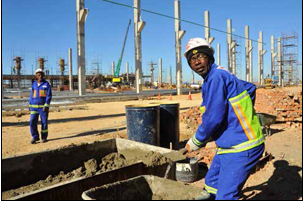 Building projects in the IDZ, situated in the Nelson Mandela Bay Metropolitan municipality, have injected over R1.2 billion into the local construction industry, creating more than 2500 jobs since the beginning of the year.
Building projects in the IDZ, situated in the Nelson Mandela Bay Metropolitan municipality, have injected over R1.2 billion into the local construction industry, creating more than 2500 jobs since the beginning of the year.
The Coega IDC is a product of the Coega Development Corporation (CDC), which is an entity owned and operated by the government.
Ayanda Vilakazi, head of Marketing and Communications at the CDC, says six major construction projects are currently underway in the IDZ, including Chinese car and truck manufacturer First Automobile Works' (FAW) new R200 million plant, food service group Famous Brands' new cold storage plant, DCD Group's wind tower manufacturing plant, the addition of Coega Cheese onto the Coega Dairy outfit, Agni Steels' R400 million smelter facility, and the extension of Rehau in the Nelson Mandela Bay Logistics Park.
Industrial gas company, Air Products South Africa, starts construction of its R300 million state-of-the-art air separation unit in Zone 3 this month, bringing the total number of projects under construction to seven.
Vilakazi says that FAW's plant construction will create about 2 000 jobs over the year-long project, which is on track for completion in December. When it starts operating, the plant will create a further 280 permanent jobs. The total investment value of FAW will amount to R600 million.
Famous Brands is building a 2 400 square metre cold storage and distribution centre valued at R200 million.
The company has also joined up with Coega Dairy to expand its operations to supply cheese products to the group in a project dubbed ‘Coega Cheese’ with a joint valued investment of R45-million injected into the Coega IDZ. It will supply cheese to the franchise stores, including Debonairs Pizza, Steers, Wimpy and Mugg and Bean.
The DCD Group is also building a R300 million wind tower factory which, once completed, will employ 168 workers, and produce between 110 and 120 wind towers annually.
Agni Steels is building a R400 million smelter facility in the IDZ. The plant will produce mild steel billets from scrap metal.
The Rehau facility in the Nelson Mandela Bay Logistics Park is also being extended to provide over 9000 square metres of manufacturing space and offices.
The Coega IDZ was established to boost manufacturing, including beneficiation of export goods, investment and local socioeconomic growth. It also serves as a major hub for developing skills and creating jobs. It offers global competitiveness through worldclass infrastructure, tax incentives, rebates and a duty-free zone.
"We currently have 20 operational investors, and once these seven construction projects are complete, we will be up to 27 operational investors by mid-2014," says Vilakazi.
Vilakazi adds that Coega has managed to attract these huge investments, despite a depressed global economic climate. “The global economic climate is still not stable, yet investment continues to flow into the Coega IDZ and is literally taking root in the construction projects underway.”
Make every day a Mandela Day
Make every day a Mandela Day sadminEvery year on 18 July, which is former President Nelson Mandela’s birthday, South Africa and the rest of the world join hands to celebrate International Mandela Day.
 In honour of Madiba’s life and values, International Mandela Day was launched in 2009 and encourages people to do some good, no matter how big or small, for 67 minutes on 18 July.
In honour of Madiba’s life and values, International Mandela Day was launched in 2009 and encourages people to do some good, no matter how big or small, for 67 minutes on 18 July.
This is in recognition of the 67 years of his life that he spent serving his community, country and the world in the struggle for peace and equality.
Due to the success of Mandela Day, the celebration of this great leader was extended to the entire month of July, which has become known as Mandela Month.
The Mandela Month message for 2013, like previous years, is centred on change with the call to Take Action; Inspire Change; Make Every Day a Mandela Day.
It urges people everywhere to play a role in making the world a better place, one step at a time, just like Madiba did.
67 minutes of service
How will you spend your 67 minutes of service this Mandela Day? There are many ways to get involved. Here are just a few suggestions:
- Create food parcels and give them to people in need, such as street children.
- Volunteer to do shopping for an elderly or disabled person.
- Volunteer at your local police station or faith-based organisation.
- Offer your help at a local children’s home or an old age home.
- Offer to look after the children of a single mother to give her a break or take the children on an outing.
- Mow someone’s lawn or help them to fix things around the garden or house.
- Read to someone who can’t read.
- Collect unused clothing and blankets from friends and donate them to homeless people.
- Collect old newspapers from a school, community centre or hospital and take them to a recycling centre.
- Visit someone in hospital.
Celebrating Mandela’s birthdays, one school at a time
Celebrating Mandela’s birthdays, one school at a time sadminSchool infrastructure
To celebrate the legacy of the global icon that is Nelson Mandela, the Department of Basic Education is upgrading infrastructure in at least 94 schools throughout the country.
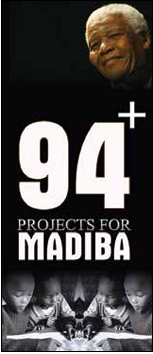 The campaign, called 94+ Projects for Madiba, tackles a cause dear to the former President’s heart - a commitment to quality education for all children in South Africa.
The campaign, called 94+ Projects for Madiba, tackles a cause dear to the former President’s heart - a commitment to quality education for all children in South Africa.
Launched last year, the project was named to mark the 94th birthday of former President Mandela. The aim of the School Infrastructure campaign is to celebrate Nelson Mandela’s birthday and legacy by giving hope and dignity to children in more than 94 schools across the country through improvements in their school infrastructure.
Since the launch, the department, working with partners from the private sector, has been hard at work to improve school infrastructure across the country, but there are still many schools that require urgent attention.
Ninety six schools have been identified for attention to date, and more will be added as they get sponsors. Up to now, 46 schools have been upgraded and work to refurbish 50 is continuing. The renovations include sprucing up school buildings; installing water and sanitation facilities, constructing administration blocks, fencing off schools, providing desks and chairs or providing kitchen units, depending on the needs of the school.
Where possible, libraries and laboratories are also being provided, as well as landscaping and gardening to create an environment that teachers and learners can enjoy.
But given the huge backlog inherited by the democratic government in 1994, the demand far outweighs the resources available to improve all schools.
Mandela School gives Mthatha modern amenities
Mandela School gives Mthatha modern amenities sadminSchool infrastructure
Work to renovate the Nelson Mandela Park Primary School is virtually complete and the community of Mthatha awaits with anticipation, the official opening of the school.
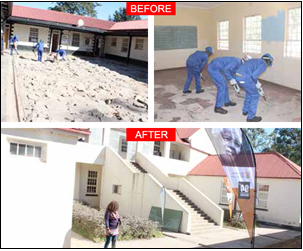 The school is expected to open after the June holidays.
The school is expected to open after the June holidays.
School principal, Xolisani Neti, says learners and community members can’t hide their excitement as their new school gets ready for occupation. “We feel so happy, we are excited. We cant wait to go to the new school.”
The 1067 learners of Mandela Park Primary School have been attending lessons in a partitioned hall. “The hall was partitioned into 10 classrooms. It had no ceiling and no ablution facilities,” says Neti.
The newly built school boasts 27 classrooms, a multi-purpose hall, computer and laboratory facilities as well as sport and recreation areas. Neti adds that the beautiful landscaping will also improve the environment.
The school forms part of the '94+ Projects for Madiba' initiative.
The school, which costs a staggering R47 million, used traditional structural steelwork to frame the buildings and an innovative light-weight steel framing system to create the internal walls.
Neti says the school will make a big impact in the community. “It will make a big difference. It is within easy reach of learners. The facilities will be accessbile to community members. It will instill a sense of ownership among members of the community as they will be able to access recreational facilities such as sports fields of high standard.”
Minister Motshekga has commended teachers at the school for persevering and continuing to teach under difficult conditions. “It is in our interest to protect and promote children’s rights to education and we are committed to doing everything we can to improve education in the country,” she said.
Japie Greyling Primary School gets makeover to celebrate Madiba
Japie Greyling Primary School gets makeover to celebrate Madiba Estelle GreeffSchool infrastructure
The Japie Greyling Primary School in Vereeniging has been refurbished as part of the '94+ Projects for Madiba' initiative which was launched in April last year.
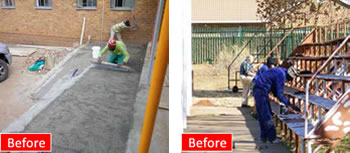 The school, unveiled by Basic Education Minister Angie Motshekga last year has been equipped with ramps and toilet facilities for children in wheelchairs.
The school, unveiled by Basic Education Minister Angie Motshekga last year has been equipped with ramps and toilet facilities for children in wheelchairs.
The school has had its roof and classrooms repaired and painted, bathrooms tiled, sports field renewed and air conditioners fitted in all classes. It also boasts a new energy efficient, low maintenance solar electric heating system in all the classrooms. The system heats up the classrooms electrically for the first two hours of the day, and thereafter, the naturally heated air in the roof voids is blown into the classrooms by fans. These fans are solar powered and can be used also to cool the classrooms in summer.
The school saw over 100 department officials, the Ferrero Social Enterprise team, builders, tilers, painters and other subcontractors working tirelessly, seven days a week, over a three month period to complete.
 "The 94+ projects for Madiba build on our growing partnership with the Nelson Mandela Foundation to mobilise teachers, parents and broader society in support of education. The Ferrero-sponsored Japie Greyling School bears testimony to great work being possible when people are united by a shared vision of reconstruction and development,” said Minister Motshekga.
"The 94+ projects for Madiba build on our growing partnership with the Nelson Mandela Foundation to mobilise teachers, parents and broader society in support of education. The Ferrero-sponsored Japie Greyling School bears testimony to great work being possible when people are united by a shared vision of reconstruction and development,” said Minister Motshekga.
Newly appointed school principal, Piet du Toit, said the school is not just renovated but feels like a completely new school.
"It's a new life, they have turned our school into a new service school, and it's got facilities for people with disabilities. Thank you is not good enough,” said an ecstatic du Toit.
Gauteng Education MEC Barbara Creecy said that through the project, 60 schools out of 1 800 provincial schools in need of renovations are currently being renovated.
"We've been inspired by the work done at the school. They've taken a sound structure and given it a facelift. This renovation will give us an opportunity to increase the number of learners in the school."
Gauteng takes HIV tests to residents' doors
Gauteng takes HIV tests to residents' doors sadminIn an effort to increase the number of people who test for HIV in the province, the Gauteng Department of Health has embarked on a massive door-to-door testing campaign.
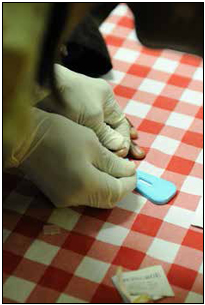 The Know Your Status Campaign is a joint initiative between the department and the Gauteng Aids Council.
The Know Your Status Campaign is a joint initiative between the department and the Gauteng Aids Council.
It aims to raise awareness about HIV/ AIDS and ensure that healthcare is delivered to all citizens in the province.
The campaign kicked off in Bekkersdal, Westonaria, recently and forms part of South Africa's response to the HIV/AIDS challenge, with the focus on prevention.
President Jacob Zuma launched the HIV Counselling and Testing (HCT) campaign in April 2009 with the overall goal to promote testing and encourage all citizens to know their HIV status.
By the end of March 2013, the HIV testing rate in the province stood at 92.9 per cent but the department still wants to increase the number of people tested by year end. It aims to do so by visiting homes across the province and encouraging people to take the test.
With the new campaign the department sends mobile units with health workers to rural communities where they go door-todoor and carry out the HIV and TB tests on residents willing to take them.
The results of the test are available immediately and health workers provide counselling before and after the tests.
The campaign not only ensures that people know their status but also encourages pregnant women to book antenatal clinic visits early into their pregnancies.
The department says antenatal visits before 20 weeks of pregnancy increased from 34 per cent to 37.3 per cent from January to March 2013.
This increase is great news for the department, which is on a mission to reduce neonatal and maternal deaths.
Back in Gauteng, other inventions that the department have introduced are aimed at reducing the waiting times at clinics.
Meanwhile other provinces have also launched door-to-door testing in various villages. Health Minister Dr Aaron Motsoaledi also took the HCT campaign to the Mafefe village in Limpopo where approximately 2 000 villagers underwent counselling and testing over a three days.
For more information contact the Gauteng Department of Health on 011 355 3000.
Hepatitis B and C: Virtually unknown, yet dangerous
Hepatitis B and C: Virtually unknown, yet dangerous sadminAbout 500 million people worldwide are living with chronic hepatitis B or C, yet awareness about this virus is so low that most of those infected don’t even know it.
Hepatitis is inflammation of the liver or a liver infection caused by a number of viruses or toxins. Hepatitis A, B and C are the most common of the six hepatitis viruses, while the B and C strains are considered the most dangerous.
Both hepatitis B and C viruses can have a major impact on your health leading to liver scarring (cirrhosis, liver cancer or liver failure). Approximately one million people die from these two hepatitis strains every year.
Hepatitis B
Hepatitis B is one of the most common viral infections in the world and is 50 to 100 times more infectious than HIV. It is found in bodily fluids such as blood, semen, sweat, tears and the breast milk of infected people, which is why it is easily transmitted to newborns. It can be spread through the use of unsterilised tattoo and body piercing instruments.
Not every one will have signs of infection but symptoms can typically include nausea, fatigue, yellowing of the skin, stomach ache, diarrhoea and aching joints. There is a vaccine available that should ideally form part of the childhood vaccination programme. Those who are not vaccinated should remember that it is never too late.
Hepatitis B is diagnosed by a simple blood test. Most people with acute hepatitis B do not need treatment and do not develop long-term liver damage. However, if the virus becomes chronic, treatment with antiviral medication will be required to prevent further damage.
Hepatitis C
Hepatitis C is mainly spread through bloodto- blood contact.
Symptoms include nausea, fatigue, aching muscles and joints, anxiety and depression, poor concentration, stomach ache and loss of appetite. There is no vaccination against hepatitis C but you can safeguard yourself against it by leading a healthy, responsible lifestyle.
Hepatitis C is not treated unless it becomes chronic and then it is treated with medicine that slows or stops the virus from damaging the liver. Should there be extensive damage to the liver upon diagnosis, you may have to undergo a liver transplant.
As the world observes World Hepatitis Day on 28 July, remember to visit your doctor if you have any of the symptoms.
How to Prevent Getting Hepatitis B or Spreading It?
To keep hepatitis B infection from spreading:
- Get vaccinated (if you have not already been infected)
- Use condoms during sex
- Wear gloves when touching or cleaning up body secretions of others on personal items, such as bandages/Band-Aids, tampons, and linen
- Cover all open cuts or wounds
- Do not share razors, toothbrushes, manicuring tools, or pierced earrings with anyone
- Do not share chewing gum Sterilize any needles you use for drugs, ear piercing or tattooing
Emergency helicopter for North West
Emergency helicopter for North West sadminResidents of the North West, who experience medical emergencies or need specialised services, can expect help much quicker after the provincial Department of Health got its first emergency helicopter.
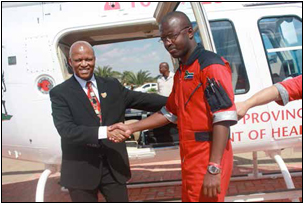 The department recently acquired the services of the helicopter, which is equipped with all the essential medical equipment and will be able to accommodate a patient who needs to be in the Intensive Care Unit.
The department recently acquired the services of the helicopter, which is equipped with all the essential medical equipment and will be able to accommodate a patient who needs to be in the Intensive Care Unit.
The helicopter service is expected to reduce the long travelling hours to health facilities in the vastly rural province.
“An emergency hospital transfer from Vryburg to Klerksdorp will now be completed within two hours where previously it would take up to six hours,” said Health MEC Magome Masike.
The helicopter will not only be used to respond to emergencies but will also provide specialised services to remote areas. Specialists will be sent to patients by helicopter where it is considered necessary.
“Due to the vastness and the rural nature of our province it is more frustrating for a sick patient who has to travel long hours to receive specialised care,” the MEC noted.
When patients call the emergency number 10177, the call centre will determine the nature of the incident and decide whether the helicopter needs to be dispatched.
“The helicopter can also be called to an emergency by paramedics on an accident scene or doctors at a healthcare facility who want to transfer a patient to another hospital as a matter of urgency,” explained MEC Masike.
The helicopter service is a joint venture between ER24 and Halo Aviation and will cost the department R750 000 a month over two years.
Mandela Month, a time for giving
Mandela Month, a time for giving sadminJuly is Nelson Mandela Month, a time when people around the world celebrate the life of former President Nelson Mandela by doing small acts of kindness for those who are less fortunate.
In 2010, the United Nations General Assembly declared July 18 as the International Nelson Mandela Day to coincide with his birthday. The Mandela Day Campaign message also encourages communities to use 67 minutes of their time to care or support a charity organization or serve in their local community. The 67 minutes represent the number of years the former President fought for human rights and the abolition of apartheid.
Vuk’uzenzele went out on the streets to find out what ordinary South Africans think about this day and how they will be using their 67 minutes to help others, following in the steps of the international icon.
Victor Mokaba
Nelson Mandela Month is when we take the time to acknowledge and celebrate the legacy that former President Nelson Mandela created to unite South Africans and foster the spirit of Ubuntu in our hearts as South Africans. As a way to do good for others and follow in the steps of the world icon, my friends and I have been running a small-scale donation scheme. We collect clothes, tinned food and blankets from our friends and families and then donate them to charity organisation just before winter begins. At one stage we managed to donate 22 bags full of items that we had collected. We do this throughout the year.
 Nontobeko Mkhize
Nontobeko MkhizeThis day means bringing the rainbow nation together all races. It’s a day to show love and give to those who are less fortunate than us. For Nelson Mandela day I plan to visit the nearby children’s home in my area. Just to lend a hand and assist where I can. I plan to do this on weekends too because it should be Nelson Mandela day every day
 Christina Mashobane
Christina Mashobane
 Every now and again greatness in a human being graces the earth. These are people who impart their wisdom so that the human race can carry on living without hate or ego. That is Mandela for me. A human being we should all learn from.
Every now and again greatness in a human being graces the earth. These are people who impart their wisdom so that the human race can carry on living without hate or ego. That is Mandela for me. A human being we should all learn from.While it is great that we have “Mandela Day” every year, I believe we should be giving back to society every day. Every day should be “Mandela Day”, not just 18 July.
Mandela Day asked us to give just 67 minutes of our time to serve others - 1 minute for each of the 67 years Madiba spent serving all South Africans to make our country a better place. We should be doing more.

Mandela Day to me renews the inspiration I get from what he has achieved as a person and a selfless leader. It is a day I strive to copy what Tata did and contribute to bringing change to the people and the beautiful country we live in.
School gets makeover to celebrate Madiba
School gets makeover to celebrate Madiba sadminThe Japie Greyling Primary School in Vereeniging has been refurbished as part of the '94+ Projects for Madiba' initiative which was launched in April last year.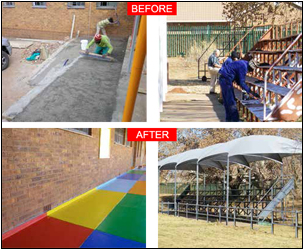
The school, unveiled by Basic Education Minister Angie Motshekga last year has been equipped with ramps and toilet facilities for children in wheelchairs.
The school has had its roof and classrooms repaired and painted, bathrooms tiled, sports field renewed and air conditioners fitted in all classes. It also boasts a new energy efficient, low maintenance solar electric heating system in all the classrooms. The system heats up the classrooms electrically for the first two hours of the day, and thereafter, the naturally heated air in the roof voids is blown into the classrooms by fans. These fans are solar powered and can be used also to cool the classrooms in summer.
The school saw over 100 department officials, the Ferrero Social Enterprise team, builders, tilers, painters and other subcontractors working tirelessly, seven days a week, over a three month period to complete.
"The 94+ projects for Madiba build on our growing partnership with the Nelson Mandela Foundation to mobilise teachers, parents and broader society in support of education. The Ferrero-sponsored Japie Greyling School bears testimony to great work being possible when people are united by a shared vision of reconstruction and development,” said Minister Motshekga.
Newly appointed school principal, Piet du Toit, said the school is not just renovated but feels like a completely new school.
"It's a new life, they have turned our school into a new service school, and it's got facilities for people with disabilities. Thank you is not good enough,” said an ecstatic du Toit.
Gauteng Education MEC Barbara Creecy said that through the project, 60 schools out of 1 800 provincial schools in need of renovations are currently being renovated.
"We've been inspired by the work done at the school. They've taken a sound structure and given it a facelift. This renovation will give us an opportunity to increase the number of learners in the school."
Education takes the fight to bullies
Education takes the fight to bullies sadminThe Department of Basic Education is stepping up measures to stop bullying at schools.
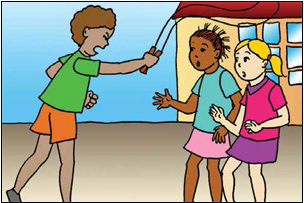 The rising number of violent attacks amongst learners in schools in the past year has prompted the department to implement regulations for safety measures at all public schools.
The rising number of violent attacks amongst learners in schools in the past year has prompted the department to implement regulations for safety measures at all public schools.
This includes incidents of bullying, fistfights, stabbings, and three separate incidents which led to deaths of learners at school.
The regulations give provincial education departments powers to conduct random searches for weapons and narcotics. Schools that can afford it can also install CCTV cameras and hand-held metal detectors, and hire security companies.
The department has also appealed to parents, teachers, school principals and communities to take action as soon as they notice signs of bullying and violence amongst learners.
What is bullying?
Bullying can be physical, verbal, or emotional teasing or taunting and is usually repeated over time. It can occur in or out of school and often takes place in classrooms or during breaks. Bullying is when an individual or usually a group of learners take advantage and gang up on or isolate one learner. Those doing the bullying usually gain the loyalty of bystanders who themselves try to avoid being the next victim.
What can parents do?
- Speak to your child and find out if he or she is experiencing problems at school.
- Assure your child that you will immediately investigate and report the situation to the school principal or a teacher.
- Encourage your child to speak to a teacher or to you every day to monitor if the bullying has stopped.
- Suggest to the school that certain areas be more supervised.
- Be sensitive as your child may be embarrassed or afraid to report the incident in fear of being bullied further.
- Avoid being a fix-it parent by calling the bully’s parent. Most of the time this is not effective.
- Do not tell your child to ignore the bully, ignoring may make the situation worse.
- Teach your child to be assertive but not aggressive.
- Monitor your child’s whereabouts and their friendships.
- Watch for signs of depression and anxiety in your child; and do not hesitate to seek professional counselling.
Avoid disappointment – apply now to tertiary institutions
Avoid disappointment – apply now to tertiary institutions sadminIf you are in Grade 12, the time to apply for admission to universities and universities of technology is now.
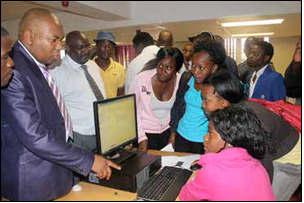 By applying early, you stand a better chance of being accepted at tertiary institutions without any hassles.
By applying early, you stand a better chance of being accepted at tertiary institutions without any hassles.
In the past, tertiary institutions have been overwhelmed by the large number of students who leave it to the last minute to apply for admission.
This caused a number of problems and even resulted in a parent losing her life during a stampede at the University of Johannesburg (UJ) in 2011.
To prevent such incidents, the Department of Higher Education and Training is driving campaigns to encourage potential students to apply early, centralised the application process and provided career guidance.
Led by Deputy Minister Mduduzi Manana, the department’s initiatives encourage learners to apply to universities when they are still in Grade 11.
The Apply Now Campaign, Central Application System (CAS) and Khetha Career Guidance were launched by the department and, according to Deputy Minister Manana, the initiatives have been a resounding success, reducing late applications, walk-ins and long queues.
The department is working on putting CAS in place to ensure that all applications go to a central location.
Currently, KwaZulu-Natal is the only province with this system and Deputy Minister Manana says the department will learn from the province’s model.
“We realise that implementing the system will not be an easy task because there are so many technical and administrative processes that need to be considered but a technical task team was assembled and implementation is expected in 2015,” he adds.
 The department has also linked the Apply Now and Khetha Career Guidance campaigns since they complement each other.
The department has also linked the Apply Now and Khetha Career Guidance campaigns since they complement each other.
Through the Apply Now Campaign, the department aims to reduce the last-minute rush experienced at most universities at the start of each academic year, while the Khetha Career Guidance campaign gives prospective students advice on which career to choose based on the needs of the economy.
Deputy Minister Manana believes it was a wise decision to link the two campaigns.
“We combined the two because I held a strong inclination that you can only apply on time when you know what you want to study.”
For more information on the campaigns contact the Department of Higher Education and Training on 0800 872 222.
School marks dawn of new era for Mthatha village
School marks dawn of new era for Mthatha village sadminThe community of Mantshayi in Mthatha was jubilant when Basic Education Minister Angie Motshekga arrived to hand over a new school.
Learners at the Nobantu Senior Primary School looked splendid in their new uniform, an indication by parents that they were ready to start on a new leaf.
Described by the Minister as the new centre for quality learning for the children in the community, the school is part of the drive to replace mud schools in the country. It was developed as part of the Accelerated Schools Infrastructure Development initiative (ASIDI) in partnership with the Development Bank of Southern Africa (DBSA).
The school was founded by Miss Nobathembu Gaba in 1995 because there was no school in the area . With permission from the community, she started the school with about 60 learners. They used mud houses provided by the community before moving to a site which was identified and a rondavel was built by the community as a classroom with no electricity or sanitation.
Built at a cost of R13.8 million, the Nobantu Senior Primary School is a state of the art school with seven classrooms, a Grade R class and modern facilities such as a science laboratory, a library, a computer laboratory, a nutrition block and a multipurpose class.
“In the Eastern Cape and all over the country, the Department of Basic Education is delivering sanitation and water facilities to schools that had never benefitted from these amenities,” said Minister Motshekga in her keynote address at the ceremony.
Premier Noxolo Kiviet said every time the executive committee visited communities, there was this concern with mud schools by the communities and as a result the provincial government approached the National Treasury with a proposal to build schools. The National Department of Basic Education introduced ASIDI as an intervention to address the problem nationally and at the end of March 2013, 17 of the 49 schools identified for replacement nationally had been delivered.
“I am very happy and overjoyed with the building of the new school because in the past during rainy days, cold weather and windy days we were sometimes forced to release the children because the structure was unsafe, especially during windy days” said the school principal, Bulelwa Rune.
* Ndyebo Kopo works for the GCIS in the Eastern Cape
Water brings hope to rural Mpumalanga
Water brings hope to rural Mpumalanga sadminIn an area where the mountains are green and air crisp, water is found in abundance in Donkerhoek, Mpumalanga.
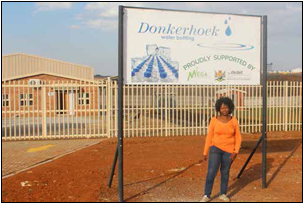 With this precious resource in their backyards, villagers of Donkerhoek are taking full advantage and have formed the Donkerhoek Water Bottling Cooperative to purify, bottle and sell the water.
With this precious resource in their backyards, villagers of Donkerhoek are taking full advantage and have formed the Donkerhoek Water Bottling Cooperative to purify, bottle and sell the water.
Construction of the factory, which will be used by the cooperative to bottle water, is now nearing completion.
The factory is situated in the village of Prospect, about 65 kilometres from Donkerhoek. It will bring hope of a better life for the people living in the villages of Driefontein, Shabalala, Prospect and Witbank.
The factory is expected to create 90 job opportunities for the locals. Its construction alone, which started in 2012, has already created 60 jobs.
Villagers are hopeful that they will be employed, providing them with a means to support their families, said chairperson of the cooperative Staff Ndaba.
“It looks like everything is finally coming together. We are excited that we will be able to create our own income from the factory and also develop the area,” said Ndaba.
Before joining the cooperative,she worked as a cashier at the local Pick n Pay “I have resigned from my job because even though we have not started with the actual bottling of the water, from the outset I believed in this project. I know it will work out and bring hope.”
The factory is a white, spacious structure, smelling of fresh paint with a reception area, boardroom, offices and a workstation where the water will be purified and bottled.
A water purifying machine with a capacity to carry 10 000 litres of water was recently assembled, while the pipes will reach deep into boreholes where the water is found.
The factory is surrounded by beautiful green mountains with trees that stand tall.
It all started with just five people, who started the cooperative in 2010, after learning from the Mpumalanga Department of Agriculture Rural Development and Land Administration (DARDLA) that the water in the area was clean.
“In 2011 we approached the National Development Agency (NDA) with our idea. The NDA was impressed and gave us R2.5 million to start the business. We are using that money to build the factory,” said Ndaba.
The NDA is a state entity, which reports to the Department of Social Development.
Maxwell Mathebula, the provincial manager of the NDA, said research was conducted by DARDLA through a service provider on how the area could be developed through agriculture.
“It was found that there was a lot of fountains that flow from the mountains into a river, creating this natural resource that the community wants to turn it into a commercial enterprise,” said Mathebula.
He added that the NDA was helping the cooperative obtain outstanding machinery so that the production can start in September 2013.
A hopeful Ndaba said soon the cooperative’s product would be on sale on local and international shelves, putting the rural Donkerhoek area on the global map.
For more information on the NDA contact info@nda.org.za or 011 018 5500.
Citrus farming puts a squeeze on poverty
Citrus farming puts a squeeze on poverty sadminThirty Limpopo villagers have pooled their resources together to turn their private land into a hugely successful citrus farm.
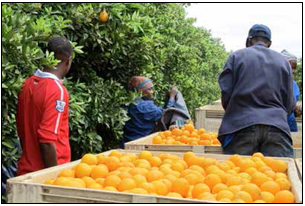 The villagers are members of the Mabunda Cooperative and were each given 10 hectares of land in the Xitlakati village, near Giyani, about 15 years ago as part of the Department of Agriculture’s efforts to help people start their own projects.
The villagers are members of the Mabunda Cooperative and were each given 10 hectares of land in the Xitlakati village, near Giyani, about 15 years ago as part of the Department of Agriculture’s efforts to help people start their own projects.
“It was just another project given to individuals to grow some vegetables and make a living. However, with 10 hectares each, members of the community decided to form a 300 hectare citrus farm,” said project manager Benet Malungani.
Today, the farm employs 63 permanent and more than 300 seasonal workers.
Most of the seasonal workers rely solely on harvest time at the citrus farm to earn an income.
According to village headman, Billy Nkuna, the project also benefits the Mabunda royal family and the rest of the community.
“The Mabunda royal family receives a payment of R18 000 per season, which is used to alleviate poverty in the village. On top of that, they support local schools with computers and uniforms for kids from disadvantaged families,” Nkuna said.
During a recent visit to the farm, Greater Giyani Mayor Pat Hlungwani said the project was an example of how cooperatives could help reduce poverty in the country.
“If everyone in any village or society could just start up something that could absorb one or 10 people, it would make a huge impact in assisting government create employment,” he said.
Hlungwani urged society to encourage children to choose careers in the agricultural sector.
“We need to come up with some kind of motivation to make them understand that agriculture is important,” he said.
The mayor was invited to the farm to hand over building material that the cooperative bought for the 63 permanent workers.
Cooperative members supplied each of the workers with eight sheets of zinc, a door, window frame and wheelbarrow to build or extend their homes.
N West dairy project milking success
N West dairy project milking success sadminFormer farmworkers in the North West, who are now running a dairy farm, have more than doubled their milk production after the provincial government gave them additional 20 cows recently.
The Syferlaagte Farm Trust, just outside Klerksdorp, used to produce 150 litres of milk daily, but after the generous donation from the North West Department of Agriculture, Conservation, Environment and Rural Development the amount of milk produced increased significantly.
The department bought 20 Holstein dairy cows for the trust, which is made up of 31 former farmworkers who acquired the farm through the Land Redistribution for Agricultural Development (LRAD) programme in 2004.
With the latest additions, there are currently 66 Holstein dairy cows on the 384 hectare farm.
The trust’s chairperson, Martin Kgethe, said the department’s contribution has been a major boost for their project.
“We have been producing 150 litres of milk per day, but since delivery of the additional 20 cows a few days ago, we are now producing 450 litres of milk per day,” explained Kgethe.
The milk produced on the farm is sold to a dairy processing plant in Klerksdorp, every second day.
The department, through its Crop Science Division, also provided the trust with cabbage and spinach seedlings, as well as carrot and beetroot seeds.
MEC for Agriculture, Conservation, Environment and Rural Development, Desbo Mohono said for the trust to succeed, the beneficiaries needed to continue working hard to ensure that the projects make a positive contribution in the fight against hunger and unemployment.
For more information contact the North West Department of Agriculture, Conservation, Environment and Rural Development on 018 389 5111.
Government names and shames corrupt individuals
Government names and shames corrupt individuals sadminGovernment has released the names of individuals who have been convicted of fraud and corruption to shame them in public.
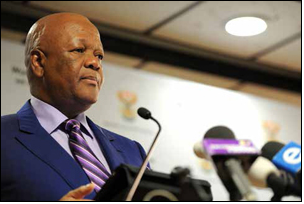 The Department of Justice and Constitutional Development said during a press conference, that the names were released to send a clear message that fraudsters and corrupt individuals have no place in both the public and private sectors.
The Department of Justice and Constitutional Development said during a press conference, that the names were released to send a clear message that fraudsters and corrupt individuals have no place in both the public and private sectors.
“The aim is to send a strong message to criminals that their actions will not go without scrutiny in the public domain. To this effect, it also aims to deter others from engaging in corrupt and criminal activities”.
The department released the names of 42 individuals who were convicted for committing fraud involving large sums of money. Other names from a long list of over 3000 convicted individuals will be released later.
Minister Jeff Radebe said members of a syndicate have been imprisoned for defrauding the Post Bank of an amount of R42 million by channeling funds into their personal accounts. “Boy Meshack Thekiso, David Mtsoane and Teboho Masoleng were sentenced to 25 years, 15 years and 15 years respectively while the case against Kabelo Kekana is still ongoing and postponed to 22 July for further investigations,” said the Minister.
In a case involving the Department of Minerals and Energy, employees were arrested for using technology to activate the profiles of people who no longer worked for the department.
They then used these profiles to record, confirm and approve payments to these ghost workers on the system.
Payments totaling R15 million were then made using these re-activated profiles. Two syndicate members Petros Mngomezulu and Simon Zungu have been convicted and sentenced to eight years imprisonment.
Another syndicate gained access to the South African Revenue Services (SARS) systems in Midrand with the assistance of a SARS employee and a consultant contracted by SARS. They changed banking details on the system to divert fraudulent refunds to the value of R77 million into their bank accounts.
Six individuals, AliRaza Naqvi, Mazhar Raza Syed, Zaheer Seedat, Samuel Thabo Gouwe, Audella Makhubu and Fiza Naqvi were arrested and convicted. Three of them were sentenced to an effective 24 years imprisonment while the other three were given 10 year sentence suspended for 5 years.
The Alfred Nzo District Municipality in the Eastern Cape was defrauded of R28 million through payments of ghost employees, tender overpayments, fraudulent vouchers and requisition orders. Three employees, Clementina Hlabi, Joyce Ngcawe and D N Sopoli were arrested and convicted.
The minister also announced that criminal investigations are underway against 242 suspects in 89 high priority cases involving serious corrupt incidents. These involve R5 million or more per incident.
Further investigations are progressing against 193 suspects. A total of 152 employees in the Justice, Crime Prevention and Security cluster of government departments were convicted for corruption, Minister Radebe said.
The cluster’s anticorruption task team (ACTT), an interdepartmental body, has been involved in fast-tracking investigations into high-priority cases. Statistics released by the ACTT show that 758 people were under investigation for corrupt activities and orders freezing R1 billion had been obtained.
The R1 billion includes forfeiture orders for R14 million brought against former Land Bank CEO Philemon Mohlahlane and Gauteng businessman Dan Mofokeng. The two were accused of defrauding the Land Bank and transferring funds to a range of outside entities for their own benefit.
Director General of Justice and Constitutional Development, Nonkululeko Sindane, added that the releasing of the names is an attempt by the department to get rid of the stigma of corruption often attached to the Public Service.
"If we didn’t do this people would continue to allege gross corruption and maladministration by government and we are trying to rid ourselves of that image, where for instances its justified because of the few individuals who are ripping government off," added Sindane.
Corruption Watch’s Executive Director David Lewis welcomed the naming and shaming, describing it as a "serious commitment" towards dealing with the problem and added that government needs to do more to fight corruption.
He called on the Department of Public Service and Administration to set up a body that is dedicated to effectively clamping down on corruption in the Public Sector.
Community crime busters of Sebokeng
Community crime busters of Sebokeng sadminJabulani Dlomo has been a champion of community crime-busting in Sebokeng for the past 16 years.
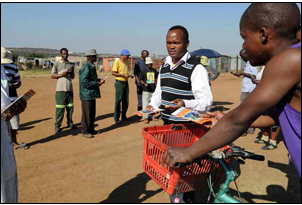 The 46-year-old has been involved in fighting crime since his arrival from Phongolo in KwaZulu-Natal in 1996. Dlomo, who was unemployed, and four other community members, started their crime fighting crusade by patrolling the streets.“I found myself settling in Sebokeng in the area of Boitumelo. What struck me the most was the high level of crime in the area, especially house robberies and people being robbed on their way to work,” said Dlomo. Then in 2002 the group attended a community meeting called by the station commander and his management at Sebokeng Police station to form a CPF.
The 46-year-old has been involved in fighting crime since his arrival from Phongolo in KwaZulu-Natal in 1996. Dlomo, who was unemployed, and four other community members, started their crime fighting crusade by patrolling the streets.“I found myself settling in Sebokeng in the area of Boitumelo. What struck me the most was the high level of crime in the area, especially house robberies and people being robbed on their way to work,” said Dlomo. Then in 2002 the group attended a community meeting called by the station commander and his management at Sebokeng Police station to form a CPF.
The group was involved in the establishment of the first CPF in the area. Between 2008 and 2012, Dlomo was appointed the chairperson of the Sebokeng CPF. Under his leadership, the CPF was awarded the title of best patrol group by the Gauteng SAPS and the Department of Community Safety in 2009.
Dlomo says the function of a CPF is to establish and maintain a partnership between the community and the police in fighting crime. He says that in Sebokeng, the working relationship between the police and the community has been smooth.
“Our forum helps build confidence in the police and the community members are not afraid to pass information to the police.”
The forum has also set up a youth desk to drive the youth away from criminal activities. On a weekly basis, the CPF goes out to the community, giving out pamphlets on crime fighting tips and meeting with street committees and patrollers.
Dlomo says it is the responsibility of every South African to join in the fight against crime, working closely with the police.
Resident Jackson Mbi says the CPF has made the community safer. “We are happy, especially with street patrols at night” said Jackson Mbi.
Sebokeng Station Commander Brigadier Scheepers says he strongly believes in involving the community in the fight against crime.
“Through the CPF, the community gets to know that as the police we are there for them.
Being seen in the community and talking to people is very important. As the police we cannot fight crime alone, we need the support of the CPF.
We can show South Africa that zero crime is possible if we work together.”
Dlomo says the CPF was responsible for nine sector crime committees, which are all functional.
He explains that when a CPF is formed, the community is separated into sector crime areas for different parts of the community. Those committees report to the CPF.
“The sector crime committees are responsible for neighbourhood watches and it’s here that community patrollers are formed. In Sebokeng, there are 680 patrollers.”
“I would encourage all South Africans to be part of ensuring that their communities are safe. It is in our hands as residents to make our country safer,” concluded Dlomo.
Sowetans find riches in rubbish
Sowetans find riches in rubbish sadminThe Zondi Buy Back Centre in Soweto has become the beacon of hope to the many unemployed residents of Zondi 1 and its surrounding areas.
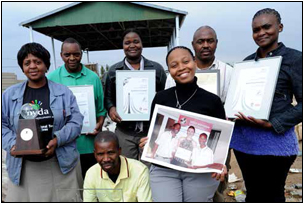 Leswe la gago le a phidisa,” is a seTswana saying which, loosely translated, means one person's trash is another person's treasure. These words have found expression in the livelihood of thousands of vagrants, trolley pullers and unemployed people who have found a way of generating income through waste recycling.
Leswe la gago le a phidisa,” is a seTswana saying which, loosely translated, means one person's trash is another person's treasure. These words have found expression in the livelihood of thousands of vagrants, trolley pullers and unemployed people who have found a way of generating income through waste recycling.
The next time you are awoken by strange sounds from your refuse bin in the early hours of the morning, don’t be alarmed. It may be the start of the early morning rush for informal recyclers salvaging recyclable material to sell at the busy Zondi Buy Back Centre in Soweto. Waste collectors earn between R50 and R200 aMembers of the Zondi Environmental Consultants with some of their trophies at the Zondi Buy Back Centre. (Picture: Katlholo Maitadi) day from salvaging.
The centre has won 13 awards for excellence and innovation in competitions supported by the Black Management Forum (BMF), the Industrial Development Corporation (IDC) and the Small Enterprise Finance Agency (SEFA).
Xoliswa Xotyane, the centre’s Financial Director recently won Best Woman and Best Manufacturing category for the recycling business. The awards came with a cash prize of R300 000.
The centre bears testimony to the hard-work and resilience of the team led by Bongani Mzantsi, Managing Director and one of the founding members. It took 11 years of blood, sweat and tears for the centre to be viable.
Mzantsi spent his early childhood in the rural parts of the Eastern Cape, where life was tough. He came to Johanneburg in his early twenties seeking a better life.
Shortly after his arrival, he formed a construction company which he ran for several years. But it did not generate enough money for him to support his family.
In May 2002, Mzantsi joined up with some locals to establish a non-profit organisation called Zimisele Community Development Project. They later approached Tuis Nkutha, a local councillor at the time, to assist them in securing the premises where they could perform their work.
He advised them to utilise an abandoned municipal building at no 666, corner of Mbatha and Koma road, where the current Zondi Buy Back Centre is located.
The building was hijacked by Amaginsa, a township word for car thiefs. It was used as a storage facility for stolen vehicles and for drag racing.
With support from the City of Johannesburg (COJ), the criminals were evicted.
By mid 2002, Zimisele was operating as a Crafts Centre. It offered various services from sewing to artwork.
Products that were manufactured were sold to the public. Members invested and paid themselves wages with the money they accrued.
In 2004, the COJ wanted to establish a Buy Back Centre as demand for waste recycling was on the rise. The city approached the group with a proposal to set up a buy back centre and came to assess the premises. After full inspection, with support from then Mayor, Amos Masondo, the buy back centre was set up.
Mzantsi, together with 11 members formed Sinqobile Trust, trading as Zondi Environmental Consultants to run the Zondi Buy Back Centre in the same year. They were fully trained on waste recycling and business opportunities. It is administered by Qotyane.
Members of Sinqobile Trust renovated the place and began operating in full.
It currently employs 56 full time employees. An additional 200 people make a living by depositing loads of recyclable waste they collect – ranging from wine, beer and cold-drink bottles, to food jars, take-away plastic containers, milk and juice cartons, cans, papers and cardboards.
The project works closely with Pikitup, the city’s waste collection agency. Trucks from Pikitup also collect the waste in Zondi and nearby places from locals in designated places every week.
After crushing the material, the centre sells it to major corporations like Collect-a-Can, Mondi Packaging South Africa, Nampak Recycling, Consol Glass, Tetra Pak, Polystyrene Packaging Council and Distell among others.
There are also educational programmes targeting young people, about recycling opportunities and positive social conduct. The management of the centre plans to employ over 100 locals next year.
“We plan to be environmentally friendly in our landfills by meeting the mandate of the city to reduce waste by 20 per cent in 2014, explains Mr Mzantsi.
Advidata gets community to live off the land
Advidata gets community to live off the land sadminAfter years of doing voluntary work for non government organisations, Nomsa Leshalabe took the plunge to set up her own business in 2007.
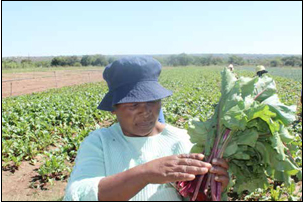 She clubbed together with her brother, Mashupye Matlala to form the Advidata Farming Co-operative in Toitskraal, some 30 kilometres from Marble Hall in Mpumalanga.
She clubbed together with her brother, Mashupye Matlala to form the Advidata Farming Co-operative in Toitskraal, some 30 kilometres from Marble Hall in Mpumalanga.
With funding from the Land and Agricultural Development Bank of Southern Africa (DBSA), they bought 230 hectares of land in Toitskraal and set about farming.
Today, the farm, which produces beetroot, sweet potatoes, maize, wheat and soya beans, employs 22 people and an additional 40 during harvest time as casuals. During the 2012 harvesting season, the farm produced 32 tons of mealies. It supplies vegetables to the community and businesses such as Pick n Pay and Spar in Marble Hall town. It also has an agreement with Medupi Power Station to supply vegetables to cook for the workers building the station.
Leshalabe also had her own harvesting to do, winning the Female Entrepreneur of the year award in the smallholder and commercial markets sections, and price money of R60, 000. The competition is run by the Limpopo Department of Agriculture Forestry and Fisheries.
Leshalabe attributes her success to passion, hard work and determination. “When I was younger my family had a farm and my father was a farmer. Farming is in me and I understand it. When I looked at starting a business, farming was the only thing that made sense to me, it’s in my blood.”
Leshalabe says she was initially motivated to start a farming business after seeing a large number of people who were unemployed, and she wanted to make a difference.
On the farm, men and women, wearing protective farming gear such as farming boots, clothing and sun hats are hard at work, digging, cutting, hoeing and sowing. Leshalabe and her workers are surrounded by hectares and hectares of green crops stretching as far as the eye can see.
To improve her skills, Leshalabe underwent training in Business Management through the Limpopo Economic Development Agency (Leda), formerly known as Limpopo Business Support Agency which is under the Limpopo Department of Economic Development.
She said that starting a business is not easy, there’ll be many obstacles along the way, but it makes you a stronger business person. “You must acquire the necessary skills to make your business work and it’s very important to network.”
Leshalabe has now become a role model to her workers such as Samantha Peba, 30, who said she has learnt a lot about running a farm and hopes that one day she can also start her own farm.
“Before I started working here, I had casual jobs in the surrounding farms, sometimes I would go for months without an income. Working for Advidata provided me with stability. I can now provide for my family, especially my seven-year-old daughter. I can make long term financial agreements because of the stability that this job gives me. I would also like to start my one farm one day.
“I know how to plant different plants and I can tell when the crop is ready for harvest. I also know the different types of fertilizers to make the soil fertile,” said Peba.
Leshalabe appealed to other women to get involved in farming and contribute towards the growth of the country.
“I would like to grow my business and export our produce. This will also allow further job creation for the community.”
She ended the interview by showing off her small flower garden and said she would like to produce flowers but needs a mentor to teach her how to farm flowers.
Limpopo MEC for Agriculture, Jacob Marule said the department organised the awards to honour women who contribute to food security, the fight against hunger and unemployment.
“I am very proud to say our department will continue to support this initiative of recognising women in agriculture. I also acknowledge Limpopo Women in Agriculture and Rural Development for spearheading women issues in Agriculture and for the promotion of female headed businesses,” he said.
Energy centre fuels community development
Energy centre fuels community development sadminResidents of Mutale village no longer have to travel 30 kilometres to Thohoyandou in Limpopo to buy paraffin, fill up their gas stoves or fill up their cars.
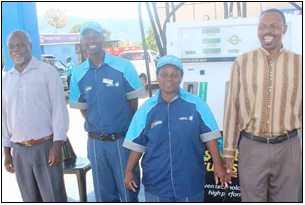 In 2005, an Integrated Energy Centre (IeC) was established in the area to meet their energy needs. IeCs serve as one-stop energy shops for communities that do not have access to energy related goods. Not only does the centre supply clean and reliable energy, it is a project for the people, run by the people.
In 2005, an Integrated Energy Centre (IeC) was established in the area to meet their energy needs. IeCs serve as one-stop energy shops for communities that do not have access to energy related goods. Not only does the centre supply clean and reliable energy, it is a project for the people, run by the people.
Members of the community have formed a registered community cooperative to run the centre. The Mutale Integrated Energy Cooperative is made up of 102 members and has 15 people employed in its convenience store, bank facilities, internet café and petrol station.
The centre is one of the National Department of Energy’s projects to provide energy solutions to rural areas in partnership with municipalities, development agencies and oil companies.
The Mutale IeC was set up in a partnership involving petrol company Sasol, the Department of Energy and the Limpopo Economic Development Agency (Leda), the Department of Trade and Industry and the Vhembe Municipality.
At the end of the financial year, a certain percentage of the profits from the IeC is ploughed back into the community’s trust fund.
Sipho Gwatuli is happy to be employed as a petrol attendant at the IeC. “After I completed my matric I was unemployed for two years. I now have an income and life is better.”
A member of the cooperative, Victor Maluleke was appointed site manager responsible for the day-to-day services of the centre.
He said the centre initially provided only energy products, but it has since expanded to have an Internet café, banking services and a convenience store.
“We wanted to expand and approached Leda for assistance in opening an Internet café and it is doing very well.”
The IeC has petrol tanks that have a capacity of carrying 44000 litres of petrol and 9000 litres of diesel.
“The tanks are filled up on a weekly basis by Sasol and this shows that the business is doing well and has potential to grow even further because of the high demand.”
Maluleke said there were plans to increase the capacity of petrol tanks to 69 000 litres and diesel tanks to 23 000 litres to meet the current high demand.
Thabang Malefu, Project Manager responsible for programmes and projects at the Department of Energy said that the Mutale IeC is one of the leading centres in the country.
“It was able to sustain itself from inception. People in the area no longer need to take a taxi to the nearest town to access services.”
He said when an IeC is opened in an area, there is usually a staff compliment of eight people, but the Mutale IeC was able to employ a further seven people, which shows that it’s making a good contribution to the community.
To date, nine IeCs have been built in the Eastern Cape, Northern Cape, KwaZulu- Natal, Limpopo and the North West Province. Malefu said the department is currently constructing two IeCs in QwaQwa in the Free State and Qamatha in the Eastern Cape.
Meanwhile, the people of Mutale plan to develop their centre into a shopping mall and bring services to more people.
For more information on Leda call 015 287 3000 or email info@libsa.co.za or log onto their website to locate their 20 district offices around Limpopo.
How olives turned the lives of rural youths & farmers
How olives turned the lives of rural youths & farmers sadminWhen Ingrid Lestrade took five teenagers to a training workshop a few years back, she was stunned when one of them suddenly said to her, “This is the first time I feel like a human being, because I have never been treated this way before.”
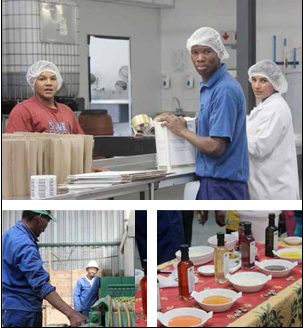 Lestrade herself grew up in poverty and knows the humiliation of having to knock on people’s doors for help very well. She was taken aback when the teenager told her that she had always had to share a bed with family members and had never had a whole plate of food all to herself.
Lestrade herself grew up in poverty and knows the humiliation of having to knock on people’s doors for help very well. She was taken aback when the teenager told her that she had always had to share a bed with family members and had never had a whole plate of food all to herself.
Lestrade is the Director at the Goedgedacht Trust, a non-governmental organisation (NGO) based at the Goedgedacht Farm in Kasteelberg in the Western Cape. The trust is a busy community development centre where Lestrade and her team work tirelessly to fight poverty and climate change in the province.
Through the trust’s flagship programme called the Path out of Poverty (POP), rural children and farmers can come, learn life and farming skills, get inspired and then go back to their own communities and continue to inspire others through a variety of projects aimed at alleviating poverty in rural areas. POP is particularly close to Lestrade’s heart and is born out of the vision that with good nutrition, education and skills training, rural children born into poverty can have very different lives from that of their parents.
“This is only an interim solution to a very big and deeply entrenched problem of child abuse and abandoned children, but this is just one of the things that shows the amazing things that can happen when you build human capacity. I believe my life would’ve taken a completely different path, maybe into teenage pregnancy and alcoholism, if it wasn’t for the guidance I received here.”
To date POP has 17 different projects which create safe spaces for vulnerable children to grow up and be cared for, healthy and educated. The three golden threads which weave their way through the projects are education, healthcare and personal development. They are designed to help break the cycle of poverty.
To help fund the programmes, the trust has an established olive farm. The farm enables Lestrade and her team to help families, as well as create a new source of sustainable farming to fight climate change.
What makes olive farming attractive is that the fruit can grow in very dry climates and this is extremely important for the Goedgedacht Trust because it is predicted that the region will be a desert by 2050.
“We live in a community of struggling wheat and grain farmers so this means they have had to start rethinking the way they do things and what they choose to farm.” Assisting farmers with skills and knowledge on planting olive trees has enabled them to plant a crop that is more sustainable in the long run.
To lend Lestrade and her team a helping hand, the Eskom Development Foundation donated olive trees that were planted on five hectares of the farm’s 12 hectare olive tree farm, a 2000 litre sprayer, a water wagon and an irrigation system. In the next five years, this investment will help the trust support 1000 children.
The Goedgedacht Trust has provided agricultural support and training to 65 emerging black farmers in the West Coast. “This small contribution will help to ensure that Goedgedacht is a sustainable organisation that continues to eradicate poverty through its innovative programmes that benefit the local community,” says Eskom Development chief executive officer Haylene Liberty.
Currently, the trust grows, harvests and produces six different fruit infused vinegar dressings, premium quality extra virgin olive oil and the famous olives that can be used in salads and many other dishes. The products are then packaged and transported to supply Pick ‘n Pay stores countrywide.
Bread brings life to the people of Acornhoek
Bread brings life to the people of Acornhoek sadminWhen the stationery shop she worked for closed down in 2010, the future looked bleak for Persistence Ndlovu.
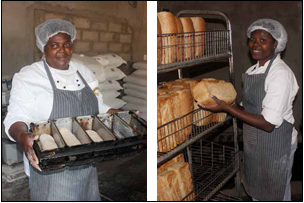 But shortly thereafter, she heard from a friend that the National Development Agency (NDA) was looking to sponsor start up businesses in Acornhoek, about 180 kilometres from Nelspruit in Mpumalanga.
But shortly thereafter, she heard from a friend that the National Development Agency (NDA) was looking to sponsor start up businesses in Acornhoek, about 180 kilometres from Nelspruit in Mpumalanga.
She clubbed together with seven other members to form the Redibone Bakery.
With funding of R1 million from the NDA in 2011, the cooperative set up its bakery.
“We bought an oven, bread mixer, a fridge and ingredients to make the bread. We are also currently expanding the premises that we are working from,” said Ndlovu.
Today, the cooperative bakes between 400 and 500 loaves of bread daily and sells every single loaf.
Maxwell Mathebula, NDA provincial manager said, “The NDA is particularly pleased with Redibone’s determination as a team and good leadership which is now paying off. The support from the NDA both financial and non-financial cannot be over emphasised. Our funding started them off the ground,” said Mathebula. He also said based on the training they received on bread making, they produced quality bread which yield loyal clients to their bakery.
The smell of freshly baked bread which wafts out from the entrance of Redibone bakery is indeed a smell of success. “The NDA equipped us with skills of starting a business and business management. We are now a fully fledged business and we are doing very well,” said Ndlovu.
The seven members of the cooperative, who are also its permanent workers, can be seen all dressed up in white coats and chef’s hats to complete the look. The bakery supplies bread to locals and supplies schools that have feeding schemes.
A typical day at the bakery starts at 6am, when the dough is made. It takes about an hour to bake the first batch of bread.
Ndlovu, who is the youngest member of the group, completed her matric in 2007 but had a dream of being involved in business.
Another member of the cooperative Meriam Ngomane said she had been unemployed for seven years after her contract employment at Metro Rail ended.
Ndlovu said they would like to see their business expand to baking scones, muffins and cakes for functions.
For more information on the NDA contact info@nda.org.za or 011 018 5500.
Stone crushers of the north uplift the community
Stone crushers of the north uplift the community sadminOn the hills of Thohoyandou lies a village called Mukula, where a group of men and women has formed a viable cooperative to crush the village’s natural resource of stones into concrete for supply to local builders.
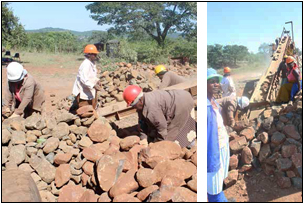 The group of 20 people from the village registered the Mukula Stone Crusher Primary Cooperative in 2000 to generate income.
The group of 20 people from the village registered the Mukula Stone Crusher Primary Cooperative in 2000 to generate income.
A year later, they secured funding from the Limpopo Economic Development Agency (Leda). “After registering our company we approached Leda to support us to get the business going. The agency came on board and gave us support with purchasing equipment to run the cooperative,” says Mercy Mbedzi, manager of the cooperative.
She says with the assistance from Leda, the company was able to purchase a stone-crushing machine, a truck to collect the stones and fence off the property where they work.
Mbedzi says the business has grown tremendously since its inception. It now supplies concrete to community members who are building houses and to housing development companies. On a good day, the cooperative manufactures about 22 tons of concrete.
To get to the premises of the cooperative, you drive along a very rocky, gravel road with humps and bumps.
It takes about 15 minutes from the main road to get to the destination where the proud villagers conduct their daily duties.
Dust sifts through the air as several women carry each stone, some weighing over 10 kilograms, rolling it into a stone-crushing machine.
The women are wearing construction boots, some are wearing hats to protect themselves from the scorching Limpopo heat.
Most of the members of the cooperative had never been employed before, others had only worked as domestic workers.
Their long and tiring day starts at 7:30am when they clean the machine used to crush stones and wait for the stone collectors to bring the stones that will soon be converted into concrete from the neighbouring mountains.
From about 10am, the stones that have been collected are crushed, until the end of the working day.
Anna Nemanghi who is employed by the cooperative and is also a member, says that before they started the cooperative, she was working as a domestic worker getting paid R180 a week. This was not enough for her to look after her seven children.
“Life was very difficult for me and my children as the money I received was not enough. When we formed the cooperative I was not sure whether it would work. I now see that it is finally bearing fruits and I am proud of the work that we do,” explained Nemanghi.
In future, members of the cooperative hope to expand their business by manufacturing bricks.
For more information call 015 287 3000
New paramedics ready to save lives
New paramedics ready to save lives sadminNhlanhla Moropodi’s neardeath experience prompted him to dream of becoming a paramedic.
Moropodi graduated at the top of his class at the Lebone College of Emergency Care in Gezina, Pretoria. Lebone is the only training institution for emergency care workers in Gauteng.
Ten years ago, Moropodi was involved in a car accident while travelling with his family in his hometown of Nigel. After seeing the photographs of his badly injured body, he felt grateful to the paramedics who had saved his life and made it his life’s purpose to become a paramedic so that he could save other lives.
Today he is one of the 67 students who completed the two-year Emergency Care Technology course recently. Twenty other students completed the Critical Care Assist course and 15 others completed the Ambulance Emergency Assistance course at the college.
All students were honoured at a graduation ceremony held recently at the college.
The proud 23-year-old said he worked extremely hard and his efforts paid off - winning him the Best Student of the Year award.
Gauteng Health MEC Hope Papo said it was young men like Moropodi who remind him of the selflessness required in working for the public.
“As a province, we are very proud and will continue supporting work towards improving the lives of the public,” said Papo.
He added that emergency services is the most important component of the health services.
“It is the first line of our health services because people are desperate when they phone the emergency medical services.” MEC Papo said his department would work hard to reduce the death of pregnant women and of people involved in accidents. “The reduction of maternal, infant and child mortality ranks highly on the department’s key priorities. This initiative will help us as a department reach this target,” said Papo.
* Lerato Mailoane works for the Gauteng Office of the Premier
Billions set aside for young entrepreneurs
Billions set aside for young entrepreneurs sadminYouth matters
A staggering R3 billion has been pledged to the National Youth Development Agency (NYDA) for stimulating the growth of young entrepreneurs over the next five years.
The commitment, which forms part of the Youth Employment Accord, will be funded by a partnership between the Department of Economic Development, the Industrial Development Corporation (IDC) and the Small Enterprise Finance Agency (SEFA).
The youth accord, signed by leaders representing government, labour, business and youth formations recently, aims to create five million new jobs for unemployed youth by 2020.
“This partnership will go a long way in facilitating the growth and development of young entrepreneurs in South Africa,” said NYDA Executive Chairperson, Yershen Pillay.
Announced at the recent budget vote of the Department of Economic Development, the project is a concrete expression of government’s call to action on job creation for young people.
Aside from the funding received, the NYDA will also work closely with the IDC and SEFA to create business development support and mentorship services for the youngsters who benefit from the fund.
Youth who apply for assistance will be screened by the NYDA and ideal candidates will be recommended to the IEC and SEFA to be granted a loan.
“The NYDA may be able to improve chances of success for any young entrepreneur who receives a loan from either the IDC or SEFA by offering business development support and mentorship services. Such an arrangement would certainly be a good example of an integrated and holistic response by government to the youth unemployment crisis,” said Pillay.
Pillay added that the project partnership is another example that job creation is not the sole responsibility of the NYDA but instead should be a collective effort by all state entities, the private sector and civil society.
For more information,contact the NYDA on 0800 52 52 52 or visit your nearest NYDA branch.
Thusano Fund comes to the rescue of needy youngsters
Thusano Fund comes to the rescue of needy youngsters sadminYouth matters
Hundreds of youngsters knock on the doors of the National Youth Development Agency (NYDA) each day seeking assistance with accessing tertiary studies, starting a business or finding a job.
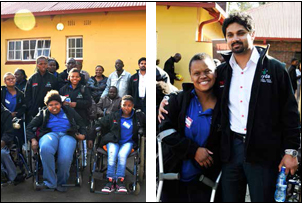 Despite assisting as many youngsters as they can, the NYDA admits that it does not have the capacity to help all the people who apply for assistance. The specialised Thusano Fund was created to assist youth or youth organisations who approach the NYDA with immediate once off needs.
Despite assisting as many youngsters as they can, the NYDA admits that it does not have the capacity to help all the people who apply for assistance. The specialised Thusano Fund was created to assist youth or youth organisations who approach the NYDA with immediate once off needs.
Thusano, which means helping one another, was launched to address the daily needs of as many young people as possible, to improve, not only their own lives but that of other young people and communities as a whole.
First on its list of recipients was the Soweto Association for People with Disabilities (SAPD). SAPD is an NGO aimed at providing care and support to empower people with disabilities. They help equip local youth with disabilities with practical skills to assist them finding a job. The NGO has however faced difficulty with scarce resources and teaching material. They then approached the NYDA for help to purchase educational equipment which included practical learning aids and apparatuses suitable for people with disabilities.
“The Thusano Fund is an initiative which is very close to my heart. We receive many requests from organisations and individuals who need small amounts of money to continue studying, upgrade their facilities or like this organisation, simply purchase learning material to equip young people with necessary skills to live independently and with dignity. While we cannot help everyone that approaches us, we do need to make a tangible difference in the lives of young people with the limited resources we have,” said NYDA Executive Chairperson, Yershen Pillay.
The NYDA has allocated 2 million to the Thusano Fund to assist young people and youth organisations who simply need a helping hand to go on and succeed.
“We may only be able to assist a few youngsters and orgnaisations, but it is better than not assisting at all,” added Pillay.
According to Johanna Sebolai, an SAPD Projector Coordinator, “The learning aids donated by the NYDA will tremendously improve our learners’ educational status and communications skills, especially in literacy and numeracy. It will assist us in teaching them to find creative solutions to daily problems and to be able to adapt their teachings to their lives, enabling them to be independent citizens.”
Microsoft turns graduates into employable computer...
Microsoft turns graduates into employable computer... sadminYouth matters
Microsoft South Africa has partnered with the government’s Jobs Fund to give unemployed graduates in the Information Technology (IT ) sector opportunities to get employed permanently in the next three years.
Three thousand unemployed graduates will sign 12-month contracts under the banner of the Jobs Fund, with a target of having at least 75 per cent of them employed in full-time jobs by the end of their training.
The Jobs Fund was announced by President Jacob Zuma during the State of the Nation Address in 2011. Following this announcement, the fund was successfully launched in June 2011 by Finance Minister Pravin Gordhan and an amount of R9 billion was set aside, to be allocated over a three-year period.
President of Microsoft International, Jean-Phillippe Courtois said the partnership with the fund will increase Microsoft’s skills development programmes through funding from the Jobs Fund and the company's own 4Afrika initiative.
Patrick Dlamini, Chief Executive Officer of the Development Bank of Southern Africa (DBSA), which administers the Jobs Fund, said the partnership with Microsoft is a major breakthrough in creating jobs in South Africa’s IT sector.
“We’ve been extremely encouraged by the way the private sector has risen to the challenge of helping create jobs in South Africa. Indeed, these types of partnerships between the private and public sectors will be significant contributors to the more than 100 524 new permanent jobs which our current portfolio of approved projects aims to create by 2015.” he said.
Mteto Nyati, Microsoft South Africa's managing director, said youth unemployment was "one of the biggest threats and challenges facing South Africa today". It is estimated that 25 per cent of all South Africans are unemployed. Seventy per cent of the unemployed are young people.
New centre keeps Mandela’s memory alive
New centre keeps Mandela’s memory alive sadminThe Nelson Mandela Centre of Memory has transformed former President Nelson Mandela’s office into a facility for public dialogue, as well as a physical home for his legacy.
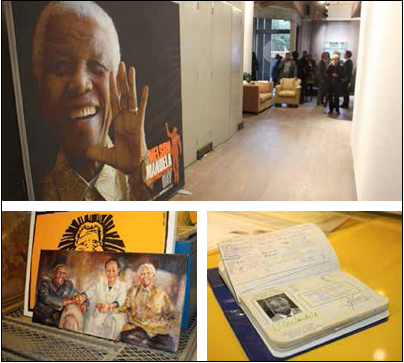 The process of refurbishing the centre, situated in Houghton, Johannesburg has been completed.
The process of refurbishing the centre, situated in Houghton, Johannesburg has been completed.
The centre’s CEO, Sello Hatang said the refurbished premises will make the work of the centre more accessible to the public. "We've got a centre that is beginning to re-imagine itself as a public resource. We want to serve as a centre that will galvanise people to do Mandela Day activities daily, organise people around dialogue, and share Madiba's legacy."
Chairperson of the Mandela Centre of Memory and chairperson of the Mandela Rhodes Foundation, Professor Njabulo Ndebele, said the three key objectives of the centre were to deliver to the world an integrated information resource on the life and times of Nelson Mandela; to convene discussions on critical social issues of the day and to share Madiba's legacy through campaigns such as Mandela Day.
At the Centre’s Archives there is a collection of Mandela materials, records of the Rivonia Trial, speeches, tributes, bibliography, filmography, a database of anti-apartheid movements’ material as well as the reflections by Mandela’s prison warders.
The archives also include the following:
Nelson Mandela Annual Lecture
The Nelson Mandela Annual Lecture series invites prominent people to drive debate on significant social issues.
The lecture series is an important event on the Centre's calendar, and encourages people to enter into dialogue – often about difficult subjects – in order to address the challenges we face today.
Previous speakers include Bill Clinton; Archbishop Desmond Tutu; former President Thabo Mbeki; world-acclaimed Chilean- American author, human rights activist and distinguished professor of Literature and Latin-American Studies Ariel Dorfman; Nobel laureate Prof Wangari Maathai and former UN Secretary General, Kofi Annan.
Dialogue for Justice Archive
The objective of the Dialogue for Justice is to develop and sustain discussions promoting the Mandela legacy.
The centre aims to use the history, experience, values, vision and leadership of former President Mandela to provide a non-partisan platform for public discourse on important social issues, and in doing so, contribute to policy decision-making.
South Africa occupies a unique space in Africa and globally as an example of a country that emerged from the deep divisions along racial, cultural and political lines primarily because of timely dialogue between all its stakeholders.
Yet, the country continues to face a range of complex challenges. The Nelson Mandela Centre of Memory seeks to keep the original spirit of inclusive and open dialogue that broke the political deadlock alive.
Access to Information
Access to information is fundamental to democracy and to the work of the Centre of Memory. Clearly then, the centre has a direct interest in any law that may restrict access to information.
This explains a longstanding and continuing engagement by the centre with processes and debates related to the Protection of State Information Bill.
Mandela Day
The main objective of Mandela Day is to inspire individuals to take action to help change the world for the better, and in doing so, build a global movement for good. Ultimately it seeks to empower communities everywhere. “Take Action; Inspire Change; Make Every Day a Mandela Day.”
Individuals and organisations are free to participate in Mandela Day as they wish. The centre however urges everyone to uphold the ethical framework of “service to one’s fellow human”.
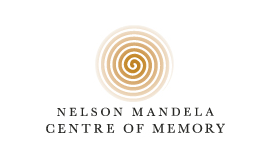 The Life and Times of Mandela
The Life and Times of Mandela
This covers former President Mandela’s Biography, his timeline where people can also find a list of important events in his life, the names which he was sometimes called, with each name having its own special meaning and story as well as the new book Nelson Mandela By Himself: The Authorised Quota-
E Cape learners get construction lessons
E Cape learners get construction lessons sadminGovernment ’s massive infrastructure drive is not only changing the country’s landscape and creating jobs but also opening up a whole new world to schoolchildren.
 Government has identified infrastructure as one the key drivers for job creation and launched 18 Strategic Infrastructure Projects to help achieve this.
Government has identified infrastructure as one the key drivers for job creation and launched 18 Strategic Infrastructure Projects to help achieve this.
With about R860 billion rand spent on infrastructure development from 2009 to the end of March 2013, significant progress has been made.
Schoolchildren from the Mthatha, in the Eastern Cape, got to witness this first hand recently when they visited the Mthatha N2 Bridge, which is nearing completion.
The bridge is one of the Presidential Projects in the King Sabatha Dalindyebo Municipality. Mthatha was declared a Rapid High Impact Presidential Intervention Node in 2009. The intervention was intended to address infrastructure backlogs and service delivery challenges and fully revitalise Mthatha through projects such as the Mthatha airport, roads, water, sanitation and electricity projects.
The excited learners of St Johns College visited the bridge to learn more about the world of civil engineering and construction.
They were accompanied by the school’s principal Zolisa Magaqa who said watching the construction of the bridge unfold first hand was better than any career exhibition.
“At our school all the learners are doing mathematics and physical science as compulsory subjects, which gives them more options to pursue engineering - one of the scarce skills in our country. At the site the learners realised the many job and skills development opportunities associated with infrastructure development,” he added.
This is what the learners had to say about the tour of the bridge:

Zihle Wandipha
During the visit I saw all the different types of equipment and what they are used for. It is good to have this bridge close to our school so that we can come here and learn about how it is being built.
Maqungo Lwazikazi
During the site visit, I learnt more about Civil Engineering with the assistance of our leading person, Kumkani Dlulani who told us about all the precautionary measures even before we got to the site. Out of the six categories of Civil Engineering, I liked Transport Engineering the most.

Vuyolwethu Mgwetyana
Listening to the presentation I learnt about how civil engineering works and the six different categories – transport, structural, technical, environmental, water and railway engineering. Now I am clear about which category I want to get involved in to do the work I will enjoy.
Fetu Sonke
The visit was very interesting and out of the six categories I want to do transport engineering because I like road services. The presentation taught me about how engineers manage their work.

Mdunyelwa Sibulele
Before I came to the site I had little knowledge about civil engineering. Now that I know what it is about, I realise that I want a career in construction engineering so I can plan structures such as bridges and roads. The exposure we received was a great opportunity for me to learn more and helped me a lot.
Lavela Mahlangeni
I gained a lot of knowledge during the site visit, which will help me decide what career to pursue. It was very interesting to find out how to start constructing a bridge from scratch.
* Sabelo Kakaza works for GCIS in the Eastern Cape.
SA praised for efforts to protect its young
SA praised for efforts to protect its young sadminThe United Nations Children's Fund (Unicef) has lauded the South African government for the remarkable progress it has made in making essential services available to vulnerable children and youth, and keeping their parents and caregivers alive.
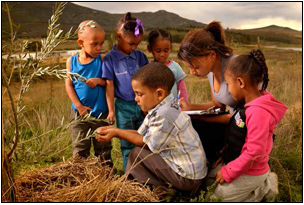 Speaking during the National Conference on Orphans, Children and Youth made vulnerable by HIV and Aids (OVCY) held recently in Durban, local Unicef Representative Aida Girma, said South Africa’s progressive legal and policy framework creates an enabling environment for the protection of children and young people, and guarantees their rights to social services.
Speaking during the National Conference on Orphans, Children and Youth made vulnerable by HIV and Aids (OVCY) held recently in Durban, local Unicef Representative Aida Girma, said South Africa’s progressive legal and policy framework creates an enabling environment for the protection of children and young people, and guarantees their rights to social services.
“The South African Children’s Act gives effect to constitutional rights through the provision of a range of services, including early childhood development (ECD) programmes,” Girma said.
Government has identified ECD as a key focus area in its effort to improve the quality of basic education and care for children. More than 836 000 children currently benefit from ECD services in South Africa. By the end of 2012, there were more than 19 500 ECD centres across the country.
Girma also praised government for extending antiretroviral treatment to 1.8 million adults so they can live to see their children grow, as well as providing antiretroviral treatment to 150 000 children who need it – up from 4 200 children in 2004. He identified the child support grants, which now reach more than 11 million poor children, as another success story of the South African Government.
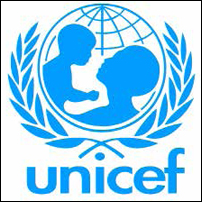 Girma added that ECD centres can be used effectively as “nodes of care and support” not only for vulnerable children, but also for their caregivers and communities. “ECD services can serve as a nucleus for a wide range of community-based HIV and Aids prevention, care and support interventions.”
Girma added that ECD centres can be used effectively as “nodes of care and support” not only for vulnerable children, but also for their caregivers and communities. “ECD services can serve as a nucleus for a wide range of community-based HIV and Aids prevention, care and support interventions.”
The conference investigated ways of strengthening families and community based responses as a support system for vulnerable children, and was held as part of the commemoration of the National Child Protection Week (CPW) that began on 27 May.
CPW is commemorated annually to raise the awareness of the rights of children as stated in the Children's Act of 2005. The campaign, which began in 1997, also aims to mobilise all sectors of society and communities in the effort of ensuring care and protection for children.
Part of the conference outcomes highlighted the urgent need for coordinated Action for Children infected and affected by HIV and AIDS and an increased rollout of support grants which would make sure that all eligible children have access to social security.
It was also agreed that an integrated communication strategy would be developed to increase awareness of risks and protective factors facing children, families and communities; and to intensify campaigns to inform and educate communities about child abuse, neglect, exploitation and the dangers of alcohol and drug abuse.
News in brief
News in brief sadminWestern Cape welcomes proud, new homeowners
There was joy and celebrations in Blue Downs, Cape Town when the Western Cape Minister of Human Settlements, Bonginkosi Madikizela welcomed the beneficiaries of the Nuwe Begin Housing (NBG) Project into into their new houses.
MEC Madikizela handing over some of the, 294 housing units that have been built, and are ready for occupation. The project will deliver a total of 1 200 at a cost of R218 million.
The houses are for South African citizens who earn less than R3500 pm, and have not previously received a housing subsidy.
Of the 1200 available BNG houses, 900 are for beneficiaries from Khayelitsha and 300 are for residents of Greater Blue Downs and Mfuleni.
Offenders use their hands to benefit the community Correctional
Services Minister Sibusiso Ndebele handed over 52 desks refurbished by offenders and 35 computers to Nozizwe Public School in Stilfontein in the North West Province.
Newcastle builds the best houses
Newcastle Municipality has won the Govan Mbeki Awards 2013 for the best Level 2 Accredited Municipality.
The award is for good work done by the municipalities in the category nominated in planning and developing Human Settlements within their area.
The municipality attributed its success to its handling of housing for its ever growing population. “The municipality is proud of having won this award. This is demonstrated by ensuring commitment to the process of facilitating sustainable housing delivery for the growing communities of Newcastle Municipality,” the Municipality said in a statement.
The Govan Mbeki Awards were introduced to promote a culture of excellence within the Human Settlement sector in the delivery of quality Human Settlements and dignity to South Africans.
KwaZulu-Natal moves closer in fighting HIV/Aids
The number of people living with HIV/ Aids in KwaZulu-Natal is declining.
Provincial MEC for Health Dr Sibongiseni Dhlomo said HIV prevalence amongst pregnant women decreased from 39.5% in 2009 to 37.4% in 2011.
The transmission of HIV from mother to child also came down from 19% in 2007 to 2.1% in July 2012 (MRC Study: 2011).
Deaths from Aids related diseases were also down from 67 429 in 2008/9 to 54 337 in 2010/11.
MEC Dhlomo ascribed the decline in HIV/Aids prevalence to efforts by the provincial government to fight the scourge.
Africa celebrates unity with song and dance
Africa celebrates unity with song and dance sadminInternational relations
Addis Ababa - Africa’s Nthambeleni Gabara 54 countries that are members of the African Union (AU), came under one roof recently to celebrate the 50 years of unity on the continent.
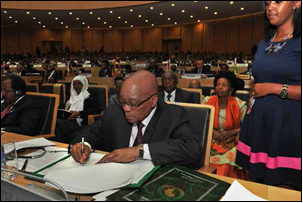 Hundreds attended the anniversary celebrations to mark the foundation of the Organisation of African Unity (OAU) established 50 years ago. The OAU gave birth to the more contemporary African Union (AU), which was inaugurated in Durban in 2002.
Hundreds attended the anniversary celebrations to mark the foundation of the Organisation of African Unity (OAU) established 50 years ago. The OAU gave birth to the more contemporary African Union (AU), which was inaugurated in Durban in 2002.
The many milestones in the continental body’s history were celebrated across Africa but Ethiopia was probably a fitting stage for the main golden jubilee. It was here that the OAU was born in 1963, giving hope to many African countries which at the time were still battling with colonialism and apartheid.
Interspersed with short messages of support from a selected list of leaders, including Former Zambian President Kenneth Kaunda, AU Commission Chairperson Nkosazana Dlamini Zuma and Ethiopia’s new leader Prime Minister Hailemariam Desalegn, the audience was treated to a programme of African traditional performances and cultural items.
The spectacular show was put together by South Africa’s well know choreographer Somizi Mhlongo.
A 10-minute video paid tribute to the late Ethiopian Prime Minister Meles Zenawi, who died last year. Zenawi was described as someone who transformed Ethiopia from a poverty-stricken country to a solid base for the AU and one of the fastest growing economies in the region.
Guests who attended included Heads of State, former presidents, diplomats and foreign representatives. President Jacob Zuma was accompanied by his International Relations Minister Maite Nkoana-Mashabane.
On the streets, people waved their flags and painted their cars with African flags, while flags of AU member states were displayed outside hotels and at several public and recreational facilities.
Inside the huge hall where the celebrations were held, those who spoke at the event stressed the need for unity and intensified efforts to render the continent free from poverty, conflict and disease.
Dlamini Zuma said: “We pledge to free our continent from malnutrition, unemployment, poverty and disease. Let us march towards a continent that is at peace with itself.” Encouraged by the ongoing economic growth in the continent over the past few years, many African leaders, including Dlamini-Zuma, believe Africa has the capacity to fund its own continental body.
She called on Africans to be part of the solutions to the continent’s problems.
The celebrations were followed by the AU Heads of State summit which explored ways of making the continent more integrated, prosperous and peaceful over the next 50 years.
A major outcome of the summit was the adoption of the African Immediate Crisis Response Capacity (AICRC), an initiative led by South Africa. On a voluntary basis, member states of the African Union will contribute troops and finance the capacity so as to act independently. So far, South Africa, Uganda and Ethiopia have pledged to implement the decision on the establishment of the capacity. Command and control will be ensured by the AU Peace and Security Council upon request of a Member State for intervention.
“We must be able to resolve conflicts that occur on our continent and deal with them amicably where they occur. The continent has made some strides but for Africa to prosper, we have to solve our current problems. You are Africa’s hope.”
In his message to mark the auspicious occasion, South Africa’s President Zuma reminded leaders that efforts must be intensified to reform the governing global order.
“While we rightfully celebrate the 50th anniversary, we are cognisant of the challenges we face. The road ahead to attain peace, stability and prosperity on the African continent for all her peoples is still arduous.
“This calls on all leaders of the continent to sharpen their resolve and through the African Union, raise our collective voices, and confront the challenges presented by the current global dispensation.”
SA, Argentina agree to farm together
SA, Argentina agree to farm together sadminInternational relations
South Africa has signed an agriculture agreement with Argentina, extending the country's programme of opening up markets with non-traditional trading partners.
Agriculture, Forestry and Fisheries Minister Tina Joemat-Pettersson signed a statement of intent with her Argentinian counterpart, Norberto Yauhar, in Pretoria recently to strengthen agricultural development and cooperation between the two countries at technical, operational and policy levels.
Speaking through a translator, Yauhar said the agreement would enhance South-South cooperation, particularly in improving agricultural production efficiencies, sharing technologies, and facilitating trade in agricultural products.
Yauhar invited Joemat-Pettersson to visit Argentina to study the country's agricultural models first-hand. The second-largest country in both South America and Latin America, Argentina shares South Africa's interest in developing small-scale farmers and in promoting "no till" technologies and bio-safety.
Minister Joemat-Pettersson expressed South Africa's appreciation for Argentina's assistance in preparing for the Food and Agriculture Organisation's 14th World Forestry Congress, to be hosted in Durban in 2015.
Argentina has participated in a number of events in South Africa, showcasing agricultural capital goods produced by medium-sized companies.
Argentinian products have been exhibited at South Africa's Nampo Harvest Day every year since 2008, and there has been extensive collaboration in the experimental field of "no till" technologies since 2007.
SA, Mozambique to increase ports cooperation
SA, Mozambique to increase ports cooperation sadminInternational relations
South Africa and Mozambique's port authorities, the Transnet National Ports Authority and Maputo Ports Development Company, have signed a landmark memorandum of understanding paving the way for increased cooperation.
The signing of the memorandum of understanding (MoU) follows extensive talks and visits over an extended period of time.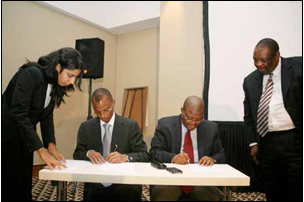
Speaking at the signing ceremony in Johannesburg recently, Transnet National Ports Authority (TNPA) chief executive Tau Morwe, said the MoU opened the way for collaboration in infrastructure development, engineering, training and marine services.
"We believe that in the spirit of cooperation, we can be exponentially more efficient and play a key role in lifting intra-regional trade within the Southern African Development Community (SADC) region from its current level of 12 percent," Morwe said.
"What we can achieve remains to be seen, but we should aspire to achieve the figures of other leading regional economic communities, such as those of Asia and Europe, where intra-regional trade is in the region of 60 percent."
Maputo Ports Development Company (MPDC) CEO Osorio Lucas said the MoU represented major potential for the two countries. "It is an important step toward, fostering greater intra-regional cooperation, which is a key priority of the SADC region and the Common Market of Eastern and Southern Africa (Comesa)," Lucas said. - SAnews.gov.za
South African artists set France on fire
South African artists set France on fire sadminSport, arts and culture
Praise singer Bulelani Zantsi got a chance to travel abroad for the first time to perform his work before a French audience in May.
 He performed at the International Biennial of Poets, which was held during South Africa’s first Season from 28 to 31 May. The highlights of the week included the opening of a major exhibition celebrating the life of former President Mandela.
He performed at the International Biennial of Poets, which was held during South Africa’s first Season from 28 to 31 May. The highlights of the week included the opening of a major exhibition celebrating the life of former President Mandela.
Entitled ‘From Prisoner to President’, the exhibition pays homage to former President Mandela who was also made an Honorary Citizen of the city of Paris.
Zantsi is one of over 800 South African artists, scientists, academics and sports people who will strut their stuff in France from May until December. The season will be celebrated in about 100 towns across France, highlighting the diversity of South Africa. It will include 250 dance and theatre performances, 100 musical concerts, 50 films, 35 workshops, 30 exhibitions, and 150 South African wines for the French to taste.
The Season in France is part of the Department of Arts and Culture’s Mzansi Golden Economy strategy to raise the profile of the arts, culture and heritage sector within the country and abroad.
Minister of Arts and Culture Paul Mashatile said the season was a result of a bilateral agreement, which aims to strengthen people-to-people relations between France and South Africa.
He said the Season in France will offer South African scientists, academics and sports people an opportunity to share their work with French audiences and facilitate collaboration with their French counterparts.
“This we believe is critical in developing our local industries and the creative industries in particular. We are confident that all involved will do us proud.”
Zantsi, a Geography, Xhosa and Arts and Culture teacher at Phakama Secondary School in Cape Town, got to show off his talent before an appreciative French audience.
“It was such a penetrating experience to represent my country and the recognition of our well-known leaders who played a crucial role during the apartheid regime in South Africa. To stand on an international stage and share praises of the most revered person in the world such as former President Nelson Mandela was such a wonderful experience,” said Zantsi.
Zantsi was overwhelmed by the positive response he received from the French. “My performances were overwhelming because of the response I received from the audience. People were ululating, clapping hands which was fantastic.”
He said his experience in France taught him to appreciate language and culture and the importance of recording history and literature, which will benefit the next generation.
“The experience will also help me to write books because the culture of reading in our schools is vanishing and more particularly our indigenous languages are facing extinction.”
Participants that have been selected to be part of the Seasons were chosen through a series of open calls for applications.
Sports bursary to build future champs
Sports bursary to build future champs sadminSport, arts and culture
The first group of schoolgoing athletes, who received the Ministerial Sport Bursary Scheme, represent the potential of future champions of South Africa, says Sport and Recreation Director- General, Alec Moemi.
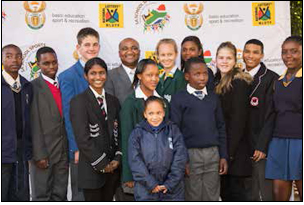 Fourteen talented and successful learners, who participated in the School Sport Championships in Kempton Park recently, received bursaries worth R100 000 each.
Fourteen talented and successful learners, who participated in the School Sport Championships in Kempton Park recently, received bursaries worth R100 000 each.
“The importance of the Ministerial Sport Bursary Scheme is to broaden the huge talent which is untapped in the country, largely because mass participation programmes have not been broadened and we don’t have a robust talent identification programme in the country.
“It is for that reason that we’ve instituted this bursary scheme to support and nurture the talent of these athletes. We believe that these children represent the potential future champions of our country,” said Moemi.
The Department of Sport and Recreation launched the South Africa School Programme in December 2011, in partnership with the Department of Basic Education. The programme kicked off last year with a countrywide registration programme for schools that were interested in taking part in the 2012 School Sport Leagues and National Championships.
The National Championships, together with the School Sport Leagues, saw all nine provinces strongly represented in nine sporting codes registered for the 2012 academic year.
Nurturing young talent
Sports Minister Fikile Mbalula unveiled the Ministerial Sport Bursary Scheme to reward the efforts of all talented young athletes in schools. This bursary scheme will award and support all the promising and dedicated school-going athletes to unleash their potential.
The bursary is valued at R100 000 per learner, with 40 per cent reserved for tuition; 48 per cent for scientific support, and 12 per cent for logistical support, such as transport. The bursary scheme will play a big role in helping the department to provide an enabling environment for grassroots sport development and high performance.
“This effort, together with all our interventions, will ensure that all our talented athletes in the school-going age are adequately supported and a conducive environment is created for their development and nurturing at all times, including providing them with a balanced, nurturing programme, with an emphasis on both academic and sport excellence,” said Moemi.
“We will not rest until all our children are given an equal opportunity to participate freely in sport and recreation,” he added.
Lukhanyo Grootboom, 14, a basketball player from Montevideo Primary School in the Western Cape says, “I’m grateful for being selected as one of the sport bursary recipients and I will use it wisely, so that I will probably become one of the best basketball players in the country in the near future.”
The bursary, which targets learners from Grade 8 – 12, will be only be valid as long as the learner is in school until matric. However, Moemi said if a learner fails and repeats an academic year, the bursary will be terminated immediately.
“That is why we emphasise a balanced academic and sport achievement and outcomes. It is our belief that this support will ultimately pay-off in the next 10 - 15 years to come. This investment in the holistic development and nurturing of our young athletes will go a long way to assist us in the realisation of our National Sport and Recreation Plan – Vision 2030.”
The bursary recipients will from now on have an opportunity to pursue both academic and sport programmes with structured support and guidance. They will have all the opportunities they want to acquire extra skills, knowledge and attitude that will benefit their participation in sport programmes, whilst at the same time contributing positively towards academic and sport results.
The athletes will also have an added opportunity to be guided by qualified and professional sport scientists, biokineticists, nutritionists and other experienced specialists in the field of medical and sport science. These athletes are attached to their nearest District or Provincial Academy with a dedicated scientific support unit to fulfill the requirements of this support.